"Military capitalism" with whites
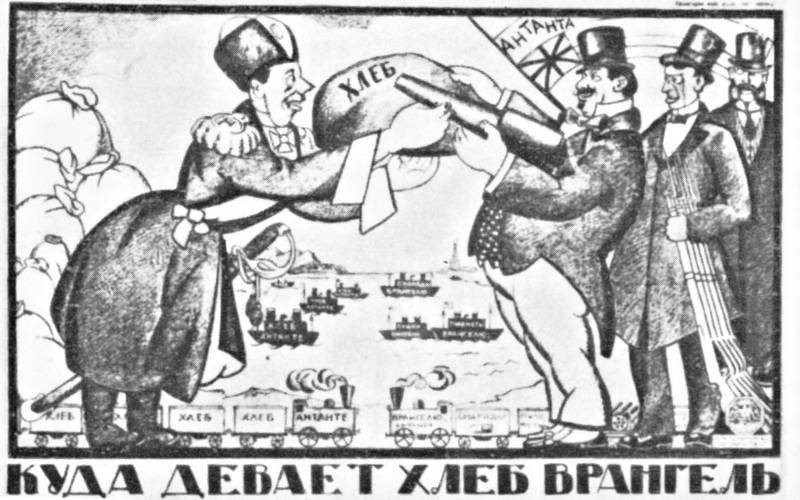
In anti-communist historiography, it is customary to refer to the horrors of “war communism” in the Civil War. However, similar processes took place in the territories controlled by whites - the expropriation of food, huge inflation, a prison for speculation.
The south of Russia, in particular, the Crimea during 1919-1920. became the sphere of domination and influence of private initiative in the field of economy. Let's see how the economy was conducted in these territories.
INDUSTRY
Coal mining in the Don basin is extremely insignificant in 1919. Coal is not enough even to supply the main consumer - the railways. The insignificant amount of production forced the government of Denikin, who was in favor of free trade, to resort to rationing prices and establishing state distribution of coal. Despite, however, the regulation and the insignificance of the size of production, industrialists are negotiating to export coal abroad, where its prices were very high. In the last period of white power in the Donets Basin, the Denikin government has authorized the export abroad of 160 thousands of tons of coal through the ports of the Azov and Black Seas. This export did not take place solely due to circumstances beyond white control. Coal exports were supposed to be in Italy and the Middle East.
The private initiative and its patrons had nothing against export, although at the same time the railways suffered from a lack of coal, and Novorossiysk had to be supplied exclusively with British coal.
A similar policy was carried out in relation to the oil industry in the Grozny and Maikop regions - the size of production was extremely insignificant (10% of the pre-war level).
Melting of metals during Denikin completely stopped. Metallurgical plants do not use blast furnaces, but open-hearth furnaces. In connection with the breakdown of transport is the idea of using locomotive plants for the repair of locomotives and use for technical purposes metallurgical plants. But the issue of repairs did not find its resolution during the existence of the volunteer army, and the release of repaired locomotives actually stops.
The situation is even worse with industry in the Crimean period. Crimea, as a country dacha, has always had a negligible industry. The government of whites has done everything in its power to destroy this industry. Data on the state of the Crimean industry in 1920 are available in the archive materials of the Department of Trade and Industry Management in the form of a questionnaire on industrial enterprises, produced in July. The questionnaire covers the entire 32 enterprise, with the number of workers in 2.663 people. The poll was mainly subjected to tobacco factories and factories producing agricultural machinery and engines.
From the questionnaire it is clear that the vast majority of enterprises work either for defense or for government food agencies. Others, although they work completely, but still, their performance is reduced by 1919-75% compared to 85 year. The reasons for the decline in productivity are reduced according to the questionnaire to the following: lack of fuel, oil, kerosene, firewood, raw materials, skilled workers.
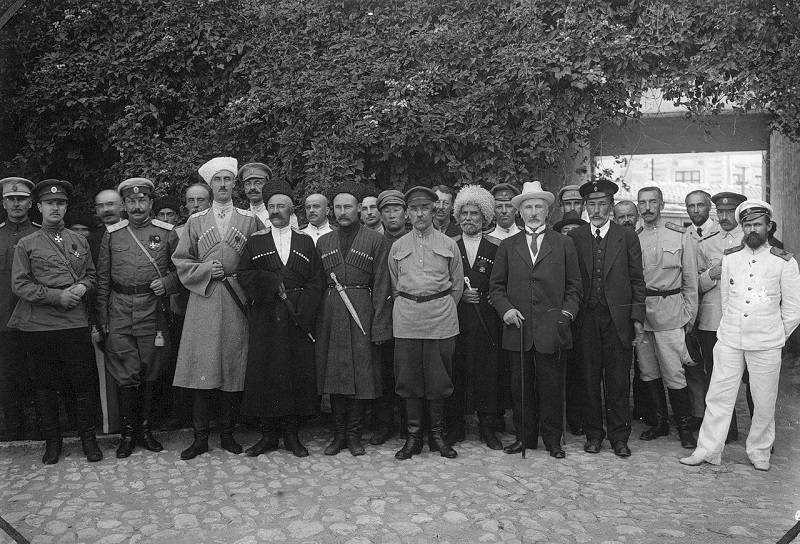
Here are some examples. The owners of the Langeman machine-building plant in Sarabuz, in their response, write that only 22 people work at the plant. Before the war, 300 people worked, during the war - over 500. Owners complain about the lack of high-quality iron. The owners of the Mesaksudi tobacco factory report that instead of the usual 7.000 pounds of tobacco per month, the factory produces 1200-1700 pounds. There is no fuel and, most importantly, leaf tobacco. The owners of the Crimean Engineering Plant in Simferopol write that their plant works exclusively for defense. Produces parts tanks and repairs armored cars. Productivity is extremely low due to the lack of scrap and bar iron.
It is interesting that at the same time leaf tobacco, scrap and high-grade iron were exported in large quantities from the Crimea abroad. This is eloquently shown by data on exports. Scrap iron was found in significant quantities in all ports of the Crimea, and the Wrangel government speculated on it, acquiring currency for it.
Some businesses complain of requisition. The plant of agricultural machines and tools of Milrud in Evpatoria was requisitioned by the Don Corps for the manufacture of boilers and field kitchens.
Thanks to the zemstvos' petition, the requisition is withdrawn in June, but the plant is still subject to the conditions that two thirds of the production should be devoted to the execution of military orders - the making of Cossack peaks.
She claimed a miserable existence, which enjoyed a special patronage of the leather industry. There were 1920-25 tanneries in Crimea in the 30 year, some of them are technically well equipped. The performance of these enterprises in the minimum calculations exceeds 100 thousand leathers of large raw materials, not counting the small ones. Raw materials for tanneries in the Crimea was quite enough. The government of General Wrangel did not stint for the tanners and gave them significant subsidies. The breeders received 120 million rubles for the purchase of extract, 30 million rubles for organizing the collection of bark and sumac, and for the purchase of fats and materials 50 million rubles. Despite the patronage, tanners, instead of the supposed 9 thousands of leathers, gave only 2 thousands per month. Control commissions, meetings, threats did not help. Leather industry withered.
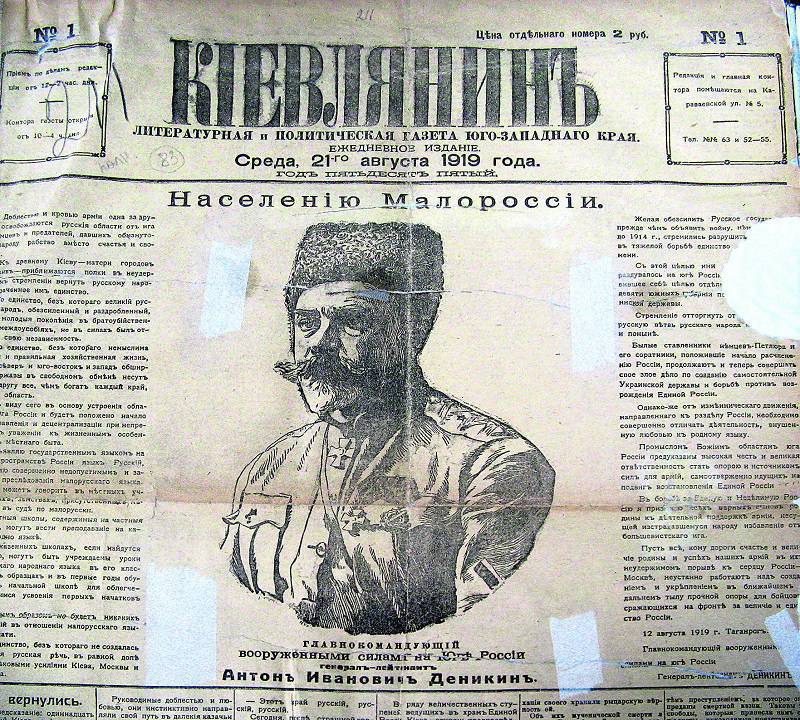
An even more interesting picture is the state of the salt industry during the reign of Wrangel. When Soviet power left the Crimea in 1919, salt remained in the mounds of the Evpatoria district - 18 million poods. 1919 mln. Poods were mined in 2, 1920 mln. In 1,6. Meanwhile, salt mines in the Evpatoria region, with the worst exploitation, are capable of producing at least 4 mln. Pounds annually.
If that was done in the field of the salt industry by whites, it was exclusively in the direction of the destruction of the fishery. The government of General Wrangel removed the access roads at many sites to build the Beshuis line.
TRADE
In the area of trade during the time of White’s management, there was a certain revival. We can say that all the capital rushed into the trade. And existing commercial and industrial enterprises, and banks, and even the government itself was engaged in trade operations. However, domestic trade in the period of Wrangel is very poorly developed. The movement of goods inside the Crimea falls to a minimum. There were many reasons for this phenomenon. Here and the disorder of transport, and underwater service, significantly undermined the horse-drawn transport. A major role was played in this regard by the revolutionary troops of the greens, which carried out systematic attacks on commodity transports and made it not safe to travel, not only along highways, but also along railways.
Domestic trade was paralyzed by the controversial policy of the White Guard government, the absence in this regard of any well-thought-out system. The government then declared domestic trade completely free, then introduced the so-called licensing system. The export of goods by cabotage was regulated by the permit system all the time.
But in the field of foreign trade a great revival is noticed. In Crimea, in 1920, a number of export-import societies emerge, aiming at creating a close relationship with the European market.
Crimea possessed reserves of raw materials available for export in the form of grain, salt, wine, tobacco, and fruit. With the occupation of Northern Tavria, the stock of grain available for export has increased quite significantly.
All exporters, as well as the government in their export operations, pursued one goal - to obtain the greatest possible amount of foreign currency, which, due to the depreciation of the Russian ruble, was highly rated in the Crimea.
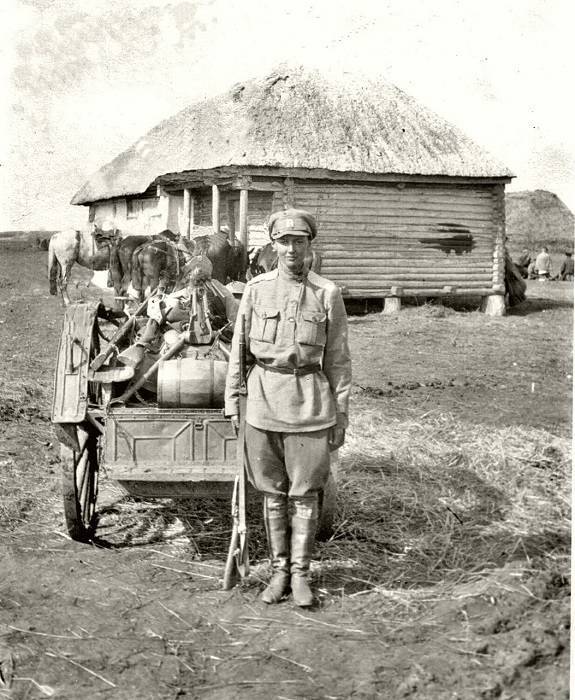
It is necessary to point out that the Wrangel government was not funded by the Allies. To purchase items of military equipment, it needed a significant monetary fund. Since the receipt of currency could be ensured solely by exporting large quantities of raw materials, therefore the government came to the idea of establishing a grain-export monopoly. This monopoly was established in August. It consisted in the fact that the government bought bread through a private vending machine, with 80% purchasing it paid at a firm contract price, and the rest 20% bought bread was paid by entrepreneurs, whose duties were to bring and load all 100% bread on a vessel chartered also by private entrepreneurs on the terms of a free contract.
The government fixed price included all the costs of purchasing, delivering and loading bread to the ships. For these services, the government guaranteed entrepreneurs to pay them 20% of the proceeds for all the quantity of grain loaded with foreign currency.
The grain resources of some areas of the Crimea, especially those that are harboring to the ports, soon turned out to be forced export. There was a significant surplus of grain in Northern Tavria thanks to the brilliant 1919 harvest of the year. The gross yield of wheat and rye in the 1919 year is determined for Northern Tavria in 80 million pounds, barley and oats - 60 million pounds.
Excluding the gross collection of those costs of planting the fields, local food supply and livestock feed, the excess bread from the 1919 crop of the year was estimated at 50 million poods and 60 million forage.
These resources of grain and grain-fodder attracted the main attention of private trading capital and the Wrangel government. The purchase of bread was made in Northern Tavria in this order: due to the existence of a grain-export monopoly, the purchase was entrusted to a whole series of government agencies that transferred the purchase to small brokers-speculators, in rare cases to cooperatives.
Since the private vending machine worked for the funds of the treasury, without risk, he absolutely did not consider raising prices.
His main goal was to get bread out of the village as quickly as possible. In the report to the commander of the 1st Army headquarters officer charged with investigating the reasons for the increase in prices for bread products in Northern Tavria, the position of the grain trade is outlined as follows:
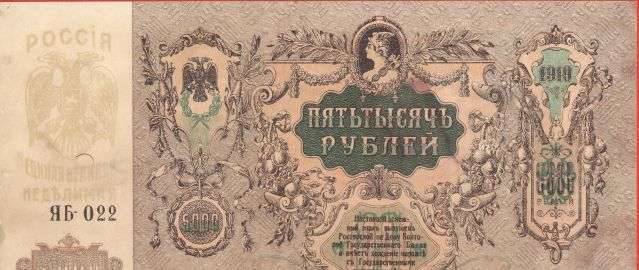
“Small agents who received power of attorney and money from government organizations and procurement commissions hand over something to these organizations, and speculate on the rest of the money, not without the knowledge of the same organizations. When purchasing bread products, prices were set: marginal (secret), firm and reference, but these prices were not mandatory for everyone.
In addition, the difference between marginal and firm prices was very large. Due to the existence of competition between the buyers when they bought without risk, this difference was equalized by them very quickly, often the purchase was made at prices higher than the marginal ones in the hope that they would soon be placed ”.
These agents, despite the existence of a monopoly, themselves exported bread abroad.
The exchange was made on the basis of partial barter. For example, 10 pounds of kerosene and 2 thousand rubles in money were paid for a pound of bread in Northern Tavria in September. Since kerosene on the market was valued at 2 thousands of rubles per pound, the price of a pound of bread was actually equal to 22 thousands of rubles.
The continuous rise in prices, caused mainly by the systematic depreciation of the Wrangel rubles, as well as the limited supply of goods during a famine, created favorable conditions for speculation. Goods brought from abroad passed from hand to hand from one merchant to another.
By issuing orders to combat this evil, both the Denikin government and the Wrangel government showed great zeal.
4 November 1919 of the Year Denikin issued a formidable temporary law on criminal liability for speculation.
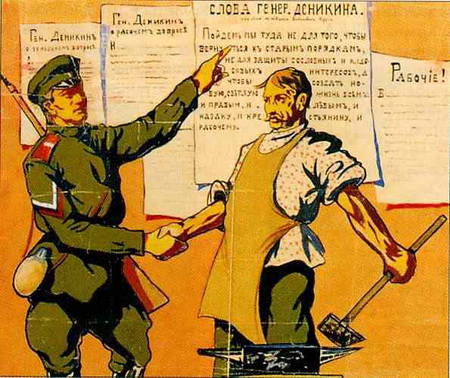
According to article 2 of this “law”, those guilty of speculation with food items or other general necessary need, or materials used to make them, are subject to: deprivation of all rights of the state and the death penalty or a link to hard labor for the period from 4 to 20 years, and In addition, the monetary recovery in 250 thousand rubles. The goods and materials belonging to the convict, which were objects of speculation, are confiscated.
Cases of speculation were withdrawn from general jurisdiction and transferred to military courts. The law promised individuals and officials for finding speculative transactions a reward of 5% of the value of confiscated goods from convicted persons.
During the entire 1920 year, trade practice in the Crimea put forward this or that product for the role of money. Here the role of money has consistently played: tobacco, wine, wool, and finally, barley. In the last months of the management of Wrangel, barley played the role of money. Under similar conditions, all the benefits from foreign trade fell to those who led it in kind.
At the beginning of 1920 of the year, the Sevastopol mayor, General Turbin, announced that the law of November 4 did not reach the goal, and therefore issues a decree imposing punishment on the speculators in an administrative manner. In order to attract the population to participate in this fight, those who have discovered speculation are promised a reward in 10% of the value of the confiscated goods. Subsequently, the remuneration was increased to 50%.
Wrangell, in turn, issued a number of similar orders; in addition, taxation of food items is used in the fight against speculation. And yet nothing helped, speculation flourished with might and main.
The practice knows a number of processes against small-scale speculators, against small fry. Here are some examples:
On September 1, in the Simferopol Military District Court, a peasant’s case was heard on the charge that he sold 27 cheese for 700 rubles per pound on May X when the market price was 500 rubles per pound. Verdict: 4 year hard labor and monetary recovery in 100 thousand rubles.
21 in August, the case of Berezina for the sale of sugar at different prices on the same day on 2.200 and on 2.400 rubles per pound. Sentence: 2, 3, a month of hard labor, and a monetary penalty.
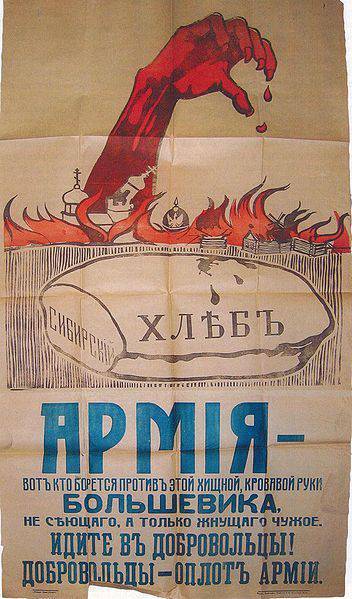
The cases are typical. Almost all newspaper reports on lawsuits against speculators are similar. The White Guard government brought down its punishing sword on the heads of the unfortunate small-scale street-trading company.
Meanwhile, speculation during the Wrangel was massive. The merchants, banks, officers, soldiers, sisters of mercy and medical assistant speculated. Another order says about officers and soldiers: “Officers and soldiers are engaged in speculation, transporting food and other items from one point to another for sale, taking advantage of the supplies they received for free from this point”. Journalists, state officials, and even the diocesan department also speculated. Some cases were brought against large speculators, but the center stopped them. Here are some examples:
The case of a representative of Vostok society, Sirotkin, who hid in the warehouses of the Slavic National Bank, with the aim of raising the price, 100 bags of sugar, 267 soap boxes, 1.200 pieces of axes, 1.000 pieces. woodworking saws and 500 linen sets. The case was dismissed, although the goods were confiscated.
FINANCE
The fact that the Allies refused to finance the government of General Wrangel predetermined in advance the financial position of the government of the armed forces in southern Russia. The last White Guard government had very limited opportunities to receive money: 1) taxes, 2) printing press.
As for taxation, the Wrangel government highlighted indirect taxation. Lined were: alcoholic beverages, wine, tobacco, sugar, tea, coffee, soft drinks. Excise rates were raised from 300 to 4000 times against the 1917 rates of the year.
Customs fees were raised relative to previous rates, first in relation to 1 to 100, and then in relation to 1 to 1000. They brought very little to Wrangel’s government: for 1920, the year of all customs duties received about 550 million - a miserable and completely insignificant figure, if we take into account the rate of Wrangel ruble.
The finance department tried to establish a monopoly on salt, tobacco, wine, etc. The salt monopoly was even established, but just before the death of the Wrangel government.
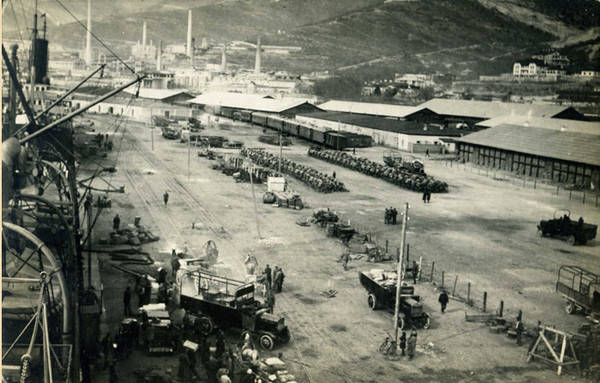
Almost the only source that fueled the Wrangel government under such conditions was the printing press. The performance of the latter was exceptional.
Regarding the amount of money issued by the government of Denikin and Wrangel, we find the following data in the magazine “Russian Economy” (financial, trade and industry authority, published in Sevastopol in September and October 1920):
Number of banknotes issued by volunteer
command in 1919 year and the Don government. 1919 year - 3 bn of which only 1920 billion was manufactured. From October 12 to November 1, an outfit of 7 billion was given.
Patronizing bankers and speculators, Bernatsky did not forget about the proletariat. We have found a very interesting report on the fight against trade unions in the archive of the Finance Department, in view of the fact that “a continuous increase in wages can lead to a complete financial collapse. The Finance Department proposes to increase the supply of labor by attracting new work items that could lower wages. These new elements were supposed to be the artels of the Red Army men, criminal criminals, and specially invited artels of workers from Turkey or the Balkan states.
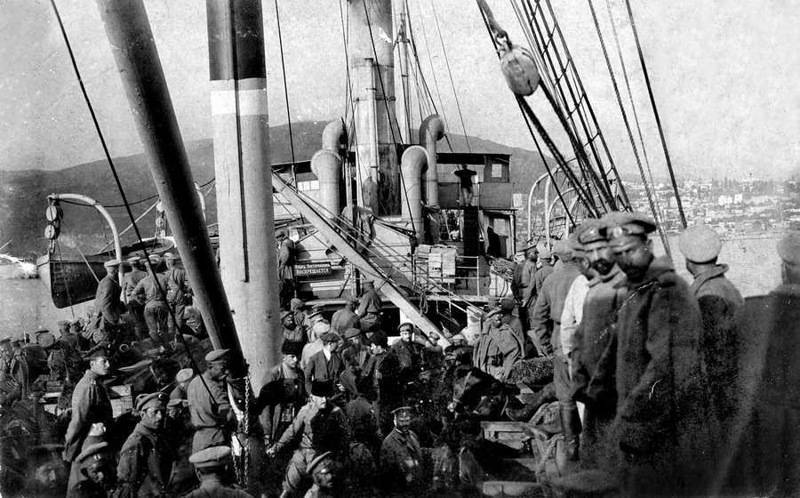
This project was implemented: the artels of prisoners and prisoners of Red Army were brought to work for which they received nothing. The artels of the workers from Turkey were not invited: Bernatsky himself soon with his friends and patron went to Turkey.
Information